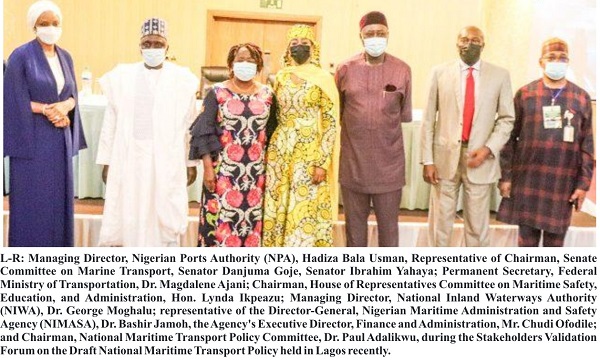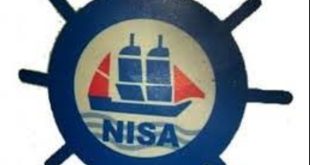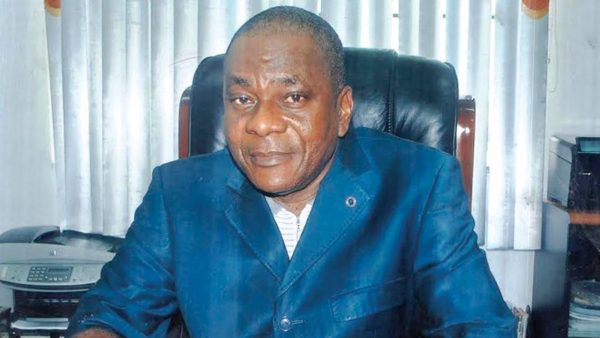 · Vision 2020 didn’t have a place for maritime transport – Usoro
· Vision 2020 didn’t have a place for maritime transport – Usoro
· Crude Affreightment: NNPC new clause prioritizes indigenous shipping companies
By Kenneth Jukpor, Ayoola Olaitan & Yusuf Odejobi
Despite the dearth of Nigerian flagged ships to grow various aspects of shipping in the nation, Nigerians have registered 265 vessels with 6,485,000dwt in other countries as stringent federal government policies and fiscal challenges continue to scare away investors.
These foreign registered ships by Nigerian beneficial owners have bigger capacity than the 726 Nigerian flagged ships with 4,526,000dwt for vessels of 100gt and above. A move to get those assets into Nigeria’s ship register would also represent approximately 37 percent increase in the nation’s fleet by flag registration.

According to statistics from the United Nations Conference on Trade and Development (UNCTAD) Stats Data Centre, Nigeria’s share of national flagged fleet is 0.2 percent of the world’s total fleet by flag registration for vessels.
The immediate-past Secretary General, of the Abuja Memorandum of Understanding, MoU, on Port State Control for West and Central African Region, Barr. (Mrs.) Mfon Usoro revealed these statistics while making a lead paper presentation at a maritime symposium, last week.
At the event to mark the 70th birthday celebration of the Chairman, Starz Group, Engr. Greg Ogbeifun, Usoro said; “How much of Nigeria’s import and export is carried onboard vessels that carry the Nigerian flag? As we talk about the African Continental Free Trade Area (AfCFTA), another reality check is the size of Nigerian ships by flag registration.”
“According to statistics by the Nigerian Maritime Administration and Safety Agency (NIMASA), we have about 722 of 100 tonnage and above. While we celebrate the fact that we are recognized by UNCTAD, if you look at the deadweight of the foreign registered vessels by Nigerians you would realize that it is higher than the vessels currently flagged Nigeria. So, we have to address the issues that make Nigerians register their vessels in other nations.”
She stressed that there is a need for Nigeria to have a plan to grow the national fleet, adding that the nation should aspire to reserve a percentage of wet and bulk cargoes for indigenous ship owners.
“Nigeria should have a target to carry a certain percentage of Africa’s trade and world trade in 10 years time. Nigerian flagged ships should constitute 1% – 2% or more of the global fleet and not a paltry 0.2 percent.”
According to her, there is a need for the government to take a central position to prioritize maritime transportation in national economic development.
While commending the fiscal and tax incentives for several sectors in the Vision 2020 economic development strategy, she noted that maritime transport wasn’t captured in the plan, hence, no fiscal incentive or tax exemption was provided.
Some of the incentives provided in the Vision 2020 framework include; zero import duty on commercial aircrafts, zero import duties on equipment and machinery for agriculture, power and mineral mining, exemption of profit on agriculture and manufacturing, exemption of dividend from tax on agriculture and LNG, among others.
Usoro stressed that ship-owners should enjoy zero import duties on ships to be registered in Nigeria, ship parts should also enjoy zero duties.
She also argued that a holistic strategy would be needed to boost fleet expansion as Ministries, Departments and Agencies’ (MDAs) cargoes should prioritize indigenous shipping companies, especially for cargoes that require Central Bank of Nigeria (CBN) approval for forex.
Corroborating Usoro’s views, the Chairperson, Sealink Promotional Shipping Company (SPV) Mrs. Dabney Shall-Holma recalled that when she joined Nigerian Shippers Council (NSC) in the 80s there were numerous incentives for ship owners.
“The incentives required to boost shipping don’t hamper the revenue generation of the country. Such incentives are still available in India, China, Japan and many other nations. These incentives have gone a long way to ensure development of the fleet in these nations.” she said.
Amid the tough economic times in 2020 occasioned by the COVID-19 pandemic, she stressed that there was a silver lining for Nigeria in the third quarter of last year.
Her words: “I was very excited when the third quarter of 2020 ended with over 91% non-oil contribution to the nation’s economy. It shows that there are potentials for other sectors beyond oil and this highlights the crucial role of shipping”
Meanwhile, the Chairman, Sea Transport Limited, Mr. Aminu Umar stressed that security challenges have also been a top limiting factor to shipping in the country.
Umar said; “No ship owner sleeps well in Nigeria because of the security challenges. There’s also the finance challenge as most financial institutions in Nigeria don’t see the need to invest in shipping.”
According to him, access to finance at single digit interest rates will remain a hindrance in the nation’s bid to grow indigenous shipping, adding that the provision of necessary incentives wouldn’t yield the desired results without access to funds.
He, however, expressed delight at the new crude affreightment clause of the Nigerian National Petroleum Corporation (NNPC) which mandates all clients interested in lifting crude to partner indigenous shipping companies.
The ship owner described this clause as novel in the nation’s shipping sector and ascribed the development to the efforts of the Nigerian Fleet Implementation Committee (NFIC).
Also speaking at the conference, the Executive Secretary of NSC, Mr. Hassan Bello posited that a viable national fleet must be private sector driven.
Bello, who is also the Chairman of the NFIC, noted that the Committee has been under pressure to speedily bring up something to serve as a national fleet but the team chose the path that will address the numerous policy issues.
He, however, lamented that Nigerian ship-owners have been accused of lacking capacity whereas they just lacked opportunities to grow their businesses.
“Nigeria lost $9.1billion freight to foreign ships in 2015 alone. This shows the need to have a fleet and the national fleet must come to fruition but it should come with modern flag registration, ship building and ship repair yards, ship finance, insurance, other fiscal incentives, etc. It should affect the whole economy. The process is painstaking and it can’t be rushed. It should be a 5-year plan and Nigeria should also work towards becoming a producing nation,” he said.
The Chief Executive Officer of Morbod Group, Barr. (Mrs.) Margaret Orakwusi harped on the need for the federal government to pay more attention to the maritime sector, stressing that the potentials of shipping wouldn’t die as the oil sector has failed.
Orakwusi, who is also the Chairperson, Nigerian Ship-owners Forum, lamented that Nigerian ship-owners are operating from a disadvantaged position without access to funding at single digit interest rates.
“In other countries ship-owners have access to funds at very low single digit interest rate for as low as 2 percent while Nigerian ship-owners get funds at 18 percent that usually increases to 20 percent, yet, we are all going to compete for the same cargoes in the global market,” she said.
The General Manager, Apapa Bulk Terminal Limited, Capt. Marvin Abe expressed regret that several engagements with the NNPC to change the terms of carriage of Nigeria’s crude from Free on Board (FOB) to Cost Insurance and Freight (CIF) have been futile.
According to him, changing the FOB contract term could enable Nigerian ship owners to buy ships to get involved in lifting crude oil, adding that such strategy is the norm in other oil exporting countries.
“I tried to bring a vessel into Nigeria to commence Cabotage. I work in an oil terminal and I wanted us to start bulk from Lagos to Calabar, Lagos to Port Harcourt and a lot of people who have money can come in. This could have been our way of little contribution and we could guide them. I went to Nigeria Customs Service (NCS) and I was told to pay 35% temporary import on the vessel. Why do I have to pay that much on a vessel that hasn’t even started making returns? We are trying to enable trade here, but they said that’s the process and that initiative died,” he narrated.
He posited that government agencies have a crucial role in the bid to salvage the nation’s shipping sector, adding that Nigeria should carve a niche for itself in shipping.
“What kind of ships do we need to start from in Nigeria? If you look at China, in 2000 they were trying to build their fleet and they invested in certain kinds of vessels but Lloyds kicked against it. China went ahead and focused on carrying their goods but gradually started developing their ship building industry and local ship register. Today, they build ships for the rest of the world but they started by developing the shipping fleet for themselves to carry their goods,” he added.
 MMS PLUS NG – Maritime, Aviation, Business, Oil and Gas News Online Newspaper with coverage in Maritime, Oil and Gas, Aviation, Power and Energy as well as Financial News
MMS PLUS NG – Maritime, Aviation, Business, Oil and Gas News Online Newspaper with coverage in Maritime, Oil and Gas, Aviation, Power and Energy as well as Financial News









